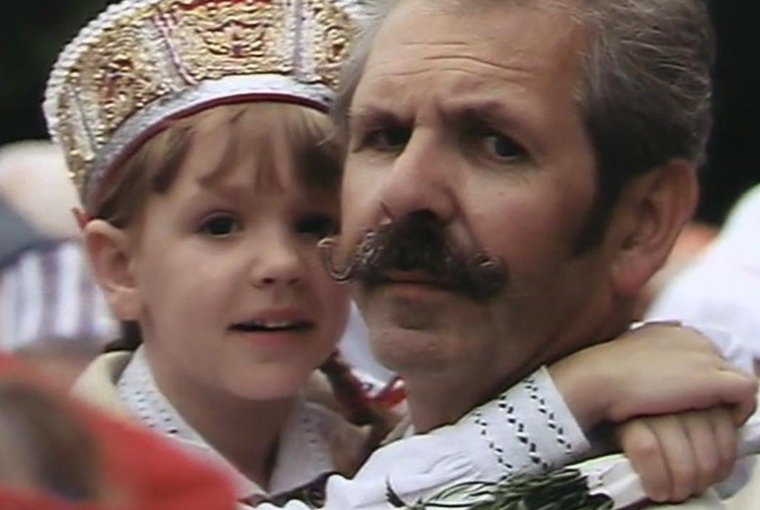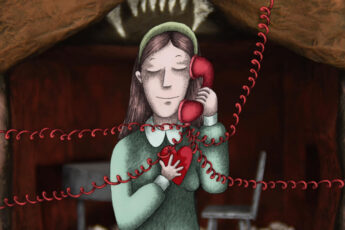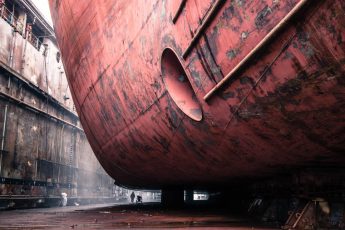Don't Shoot
Juris Podnieks’ Homeland (Krustceļš, 1990)
Vol. 21 (September 2012) by Colette de Castro
During the late years of the Soviets’ reign over the Baltic states, Juris Podnieks became an icon in Latvia and throughout the USSR. His documentary about young people in Latvia –Is it easy to be young? (Vai viegli but jaunam?, 1987) -, had created widespread awareness of his radical style of filmmaking. The film exposed problems facing young people living in the Soviet Union. A dozen or so youths were prosecuted for having vandalised a train on their way home from a rock concert. Podnieks had filmed at the concert and managed to track down the perpetrators. Interviews with the teenagers shine out as moments of truth amidst long legal proceedings and droning lectures from the authorities. Lack of direction, frustration and anger became a metaphor for their loss of identity. Though the film was finished during the times of Glasnost, it barely made it into distribution, first being screened in Russia, and then in Latvia, its country of origin.
Ten Minutes Older (Par desmit minutem vecak, 1978), an earlier film by Herz Frank for which Podnieks did the cinematography, quickly reveals another reason for Podnieks’ fame: his talent for portraying on-screen emotion. The film focuses on the face of a young boy watching a puppet show, his face creasing with each passing moment – a slight smile followed by a minute frown. Suddenly it contorts into a mask of horror, his little hand covers his mouth, and his eyes widen as some unknown atrocity occurs on stage. The film lasts only ten minutes, and along with the children, we too become ten minutes older. Like all good documentaries, it’s not just about what we see, it’s about what they see. There’s an old military saying advising soldiers not to waste their ammunition: “Don’t shoot until you see the whites of their eyes”. Podnieks, too, doesn’t start shooting before he spots the whites of the young people’s eyes; as the tears pour down this little boy’s face, we suddenly understand innocence more profoundly than any words could express.
In the late eighties Podnieks was asked to collaborate with British television, where he helped give the world important insight into events in the Soviet Union. With the help of UK’s Central Television Company, Podnieks filmed a five-part documentary about life in the Soviet Union called Hello, do you hear us?, a series that exposes widespread economical and social problems in the USSR. Following this he made Homeland; the film which was to become Podnieks’ swansong. It records the folk festivals in Lithuania, Estonia and Latvia at which the nationalsongs which had been banned during the Soviet occupation were sung by choirs of thousands as a sign of protest. In places where these traditional choruses had been forbidden, voices finally rang out. An aesthetic that prevails in Podnieks’ films is that of sound and silence; speech is often a sign of resistance, while a lack thereof comes to represent poverty and pain. Through this medium of song, a film about the Baltic independence movement was born, a historical record.
Graduate of the Soviet VGIK film school in Moscow, and student of the Riga tradition of poetic documentary, Podnieks chose to present this film without the aid of a narrator. The images speak for themselves. This absence of narration marks the difference between Baltic state-funded propaganda films (Uus Elu, 1951 [Estonia] or Nenusimink, Virginijau, 1962 [Lithuania]) and those of this intrepid film crew based in the Latvian capital.
Interspersed with choral singing we meet the characters of the documentary, individuals whose lives have been altered by the Soviet invasion. First we meet an old woman who narrowly escaped execution at the hands of the Russians during their initial take-over. She believes she escaped execution thanks to her Russian name, though that didn’t save her from years in a Russian gulag. We also see protesters rallying against Latvians being sent to Afghanistan. Filming takes place not only in the Baltic states, but also in Siberia where the film crew sets out to find those who were exiled from their countries.
The sign of the cross permeates this film. It is embroidered onto the clothes of the singers, it is around their necks and in their hands. The camera slowly approaches a hill of crosses in the Lithuanian countryside. Initially see just a few large crosses, but then the camera zooms out to reveal a hill crammed with them, their dark wood making them seem closer together. The crosses are filmed with great care as the camera presses up to their sides at a right angle, this forest of crosses representing the people who have died. A local craftsman who constructs them explains the significance of the cross for Lithuanian people. Although the peaceful altar on the hill had been razed to the ground twice by the Soviets, it had twice been built back up. Later, a young woman describes her interpretation of the true meaning of the cross: the spine representing spirituality, and the lateral bar representing the material things in life. Thus the point where the two meet represents the ‘beginning’. The woman grew up believing that she would have to spend her whole life “in silence”. The joining point of the cross, her beginning, is the freedom of speech. A revolutionary word.
Latvia declared itself a sovereign nation on the 4th of May 1990, the year that this film came out. Nevertheless, many members of the crew, including two cameramen, didn’t live through that day. While filming the follow-up to Homeland in January of 1991, the crew was targeted by snipers during the Soviet coup in Riga. Andris Slapins, a cameraman long time friend of Podnieks, was killed instantly, and Gvido Zvaigzne (also cameraman) died a few weeks later from his injuries. They were filming at the time. The Independent tells us that “Andris, who lay dying on the ice, cried out: ‘Film me, film me’. Podnieks picked up his friend’s bloody video-camera and pointed it at him”. The footage, later broadcast as a postscript to Homeland can now be found on YouTube. In 1992 Juris went diving for lobsters near Riga. His body was found at the bottom of a river a few days later. While strongly Latvian, Podnieks’ films are relevant to all the Baltic states. Homeland is a film which highlights both the individuality of each country and their common crusade: gaining independence from the Soviets. A man who will go down in history, Podnieks was a director who dared to shoot documentaries, when others were shooting to kill.




Leave a Comment